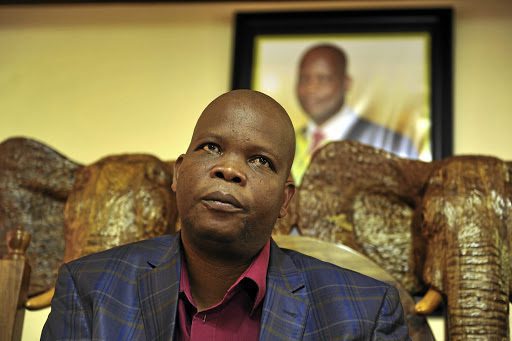The battle for the VhaVenda kingdom between King Toni Ramabulana-Mphephu (in the picture) and his niece Princess Masindi Mphephu is far from over.
A year after the Supreme Court of Appeal (SCA) ruled that Masindi was eligible to lead VhaVenda as queen, setting aside the recognition of Ramabulana-Mphephu as king, the legal battle has now escalated to the highest court in the land.
Sunday World can reveal that Ramabulana-Mphephu has filed papers at the Constitutional Court (ConCourt), asking it to set aside the SCA judgment against him and its decision to refer the matter back to the Limpopo High Court.
He has also asked for an order compelling President Cyril Ramaphosa to correct the certificate of recognition he has given to Masindi as the rightful queen of VhaVenda. Ramabulana-Mphephu, who was also implicated in the VBS scandal, asked for condonation for fi ling papers late as he was expected to challenge the SCA judgment 15 days after it was issued in April last year.
In his papers, he has urged the ConCourt to set aside the reports by the national and Limpopo houses of traditional leaders, who found that Masindi was the rightful queen. The two traditional houses found that though Masindi was born before her father Dimbanyika, Toni’s older brother, could become king, she was born from a Dzekiso wife (of royal blood), as was required by the customs of VhaVenda.
The reports, which have been handed over to the Limpopo High Court, found that Ramabulana-Mphephu was not eligible to be king because he was an Indumi, an assistant to the king, and they said VhaVenda customs prohibited an Indumi from becoming king. However, in court papers, Ramabulana-Mphephu’s lawyer, Paul Makhavhu, said the SCA erred in its judgment.
He said the court also erred in referring the matter to the Limpopo High Court. Makhavhu said the SCA judgment was flawed in that it gave the respondent, Masindi, relief which she never sought, by requesting that the Limpopo and the national houses of traditional leaders be asked to assist the court in determining the practices of VhaVenda in deciding who becomes the leader.
“The SCA erred in ordering the fifth and sixth respondents to provide the high court with opinion evidence outside the said respondents’ legislative mandate,” said Makhavhu in his submissions.
“The SCA erred further in ordering the fifth and sixth respondents to furnish opinion evidence on issues that a high court was invited to determine.
“The SCA erred in not appreciating the fact that its referral of the matter back to the high court for the adjudication of the merits thereof is brutum fulmen [an ineffectual legal judgment]; and the SCA erred in remitting the matter back to the high court for determination in circumstances where the identification of the heir to the throne of VhaVenda can, in law, only be done by the royal family.”
He said the SCA also pronounced itself on matters that were not in the appeal, especially around the eligibility of a candidate to become king or queen, and whether an Indumi qualified to become king. Makhavhu said these issues were not part of Masindi’s appeal and therefore the SCA should not have pronounced itself on them since they were never part of the relief sought.
Masindi’s lawyer, Johann Hammann, confirmed knowledge of the ConCourt application by Ramabulana-Mphephu and said they were going to oppose it. “We will also apply for leave to cross-appeal the SCA’s judgment. We will also ask the ConCourt to finalise our original application and declare Princess Masindi as queen of VhaVenda,” said Hammann.
He said the ConCourt application was part of Ramabulana-Mphephu’s delaying tactics and was 15 months late. “He first threatened to take the report of the traditional leaders on review and when he realised that he cannot take it on review, came up with this appeal.”



